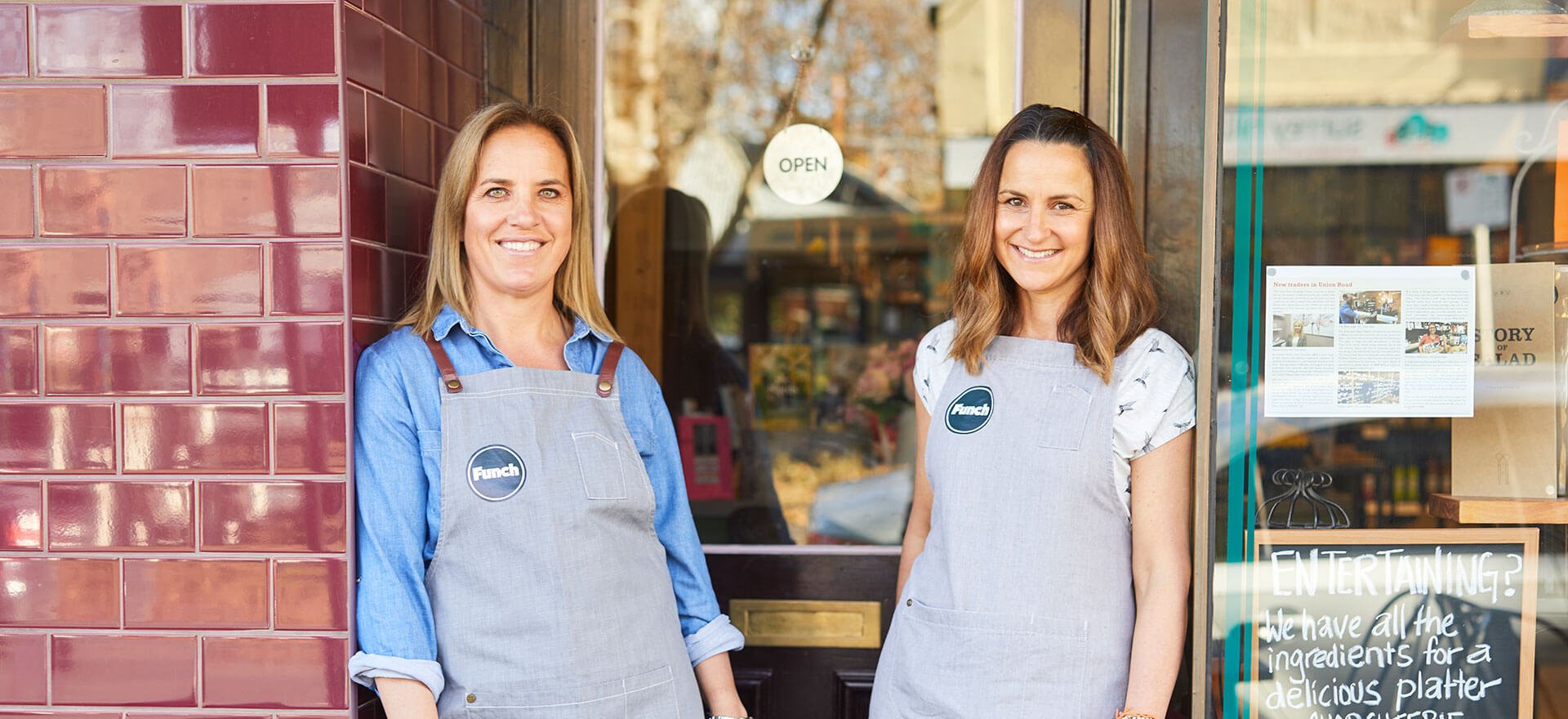Tanya Duncan and Lisa Bourne met at the gym and became good friends when their kids started school together. A fruitless search for healthy, sugar-free snacks for their kids’ lunches led the pair to co-found Funch in 2014.
Tanya and Lisa met when their kids were growing up together. A common interest in health and fitness started a friendship that became the foundation for Funch – a range of healthy pre-mixed all-natural snacks for kids and adults.
“Lisa and I used to go to the same gym at the same time, so we struck up a friendship around that shared interest. Once our kids started going to school together and we started packing lunch boxes every day, we both realised how little there was on offer in the way of healthy and tasty snacks in the supermarket. It was almost impossible to find snacks that were actually healthy, low in sugar, had no additives, preservatives, or that didn’t include ingredients we couldn’t understand or pronounce on the back of the packs.” So, they decided to make their own.
A shining light in the nutritional void
From this initial insight, Tanya and Lisa saw an opportunity to fill the nutritional void. From their own experience, they saw how an interest in exercise can lead to an interest in nutrition and healthy eating. They wanted to make healthy snacks accessible, which meant they needed to be cost-effective, fun for kids to make, and adaptable to account for various allergies and dietary requirements.
“The business evolved into making premix products, which we saw as being very similar to a cake mix concept. You simply add two wet ingredients to make up the finished product. It’s quick, it’s easy, it’s convenient but there’s still a level of involvement for the parents and the kids who are making the product. I think once people have an increased awareness of their personal health and their family’s health they tend to want to be involved in the process a little bit. Making the product pre-mix instead of ready to eat also meant we could sell them at a lower price point too. If you went to a store to buy protein or bliss balls, they may cost $4 a ball, whereas with our balls, you can make up a pack of 15 at one time and pop them in the fridge and you’re set for the week.”
One small step back, and one giant leap for forward
When they started out, Tanya and Lisa handmade all the products themselves – not just pre-mix but ready to eat snacks. They made them, packaged them and hand delivered them. They realised quickly this labour-intensive business model wasn’t viable. So they made time to reflect, take a step back and think about a more strategic business model, and that’s how they landed on the premix model.
“Rather than just going and buying a packet off the shelf, kids or parents are actually involved in the process, which gives them ownership over their health and food. People can customise the recipe to suit their taste too. If you prefer nut butter, or don’t like coconut oil, you can substitute and play around with the recipe. Our snacks tick the box of nude food, and knowing where your food comes from.”
Through iterations and testing to distribution.
It took a lot of testing and iterations to land on their final premix recipes. While the products were certainly initially designed for kids, they noticed their products were enjoyed equally by parents, adults, and teenagers.
“When planning the recipes, there were a couple of things we wanted from the outset. They had to be all-natural ingredients, work with no sugar, and for it to be so simple to make that kids could do it on their own – so now, you just add two wet ingredients. So there were all those things we were testing, and experimenting with the different ingredients and then ultimately we came up with what we thought worked and we took it to one of our local school markets, and it was a good response. So from there, we started to take it more widely. We went to local health food stores, to see if they would be prepared to stock us which they were. And then again this continued to evolve from there and eventually, we started out with a distributor and we’ve continued to grow from there.”
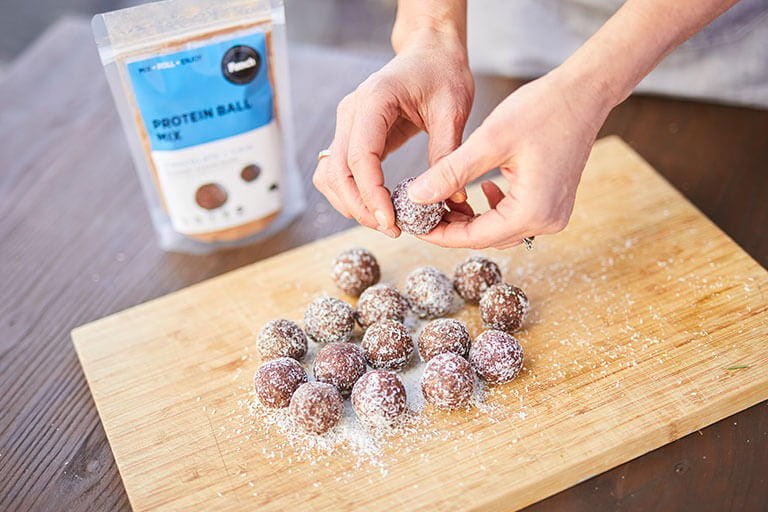
Life before Funch
Tanya’s background in marketing and Lisa’s experience in retail and sales helped fast-track the growth of their new budding company, but the financial side of running a business took some quick on-the-job learning.
“I’ve worked as a Marketing Manager for various companies, which has come in handy. It’s meant that I’ve been able to be involved with the design, the packaging, the website, and social media – all that marketing stuff. Lisa’s skills with sales and experience in retail have been fantastic. But we still had to learn a lot – the production processes and the accounting side of managing a business. So have certainly transferred some good skills into Funch, but we have had to learn more about other aspects of the business.”
All for one, then one for all
When they set out, Tanya and Lisa had a singular audience in mind – school kids. They wanted to create snacks that kids would love seeing in their lunch boxes. But they soon realised they had universal appeal and the parents and adults buying them were enjoying them as much as the kids.
“When we developed the product originally, we definitely had kids’ lunch boxes in mind. But the product very quickly evolved to focus on parents and adults who want to eat well. And so it evolved into a selection of products that are suitable for health-conscious parents as well as their kids. Our protein balls and bliss balls are the ideal snacks for when you’re busy at work and you want a bit of energy or a bit of a boost. They’re also perfect for when you get home and you’re desperate for something to eat, but you want to avoid grabbing the chocolate bar, or the chips, or some other unhealthy grab-n-go snack.”
Flexible by design
Tanya and Lisa were both new parents when they started Funch. They experienced the common challenge of trying to juggle the challenges of raising a baby and getting back into the workforce. While they worked part-time, they set about starting Funch to take full control of their work life and breathe even more flexibility into their work-life balance.
“It can be quite challenging to find work that’s flexible enough to facilitate raising a family. So I guess that was good motivation to start our own business – the flexibility was appealing. We certainly didn’t sit down and go, “okay, we want to start a business, what are we gonna do?”. We went, “okay finding healthy snack food is a real problem for us, we could do it ourselves”. Then we just kind of thought, why not? There was no real reason not to start a business. And I guess the appealing part of doing that was that we have the autonomy to work around our families.”
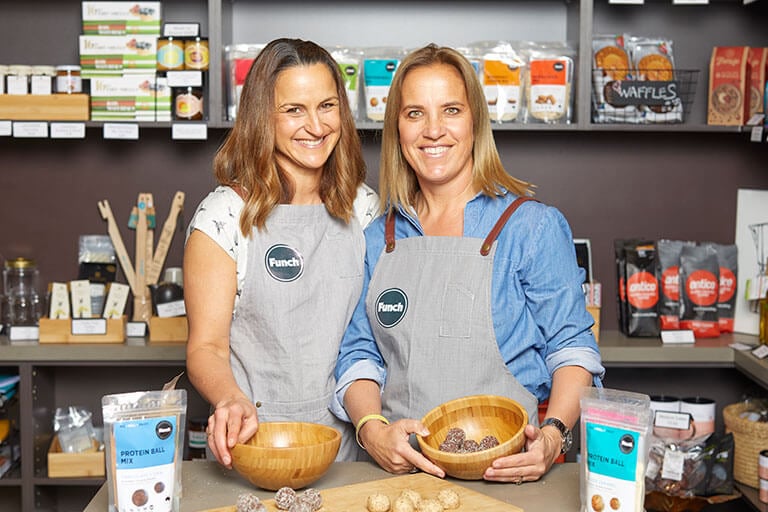
Small win. Big boost.
Obviously, Tanya and Lisa believed in their business, but one of their first wins early on fortified their confidence. A small win especially in the context of their current supply network, but a big win at the time.
“Early on the goal was to get the products into retail stores. We saw that as being the space we needed to be in to actually increase our sales and grow our business. We worked with a number of distributors and then we began to explore other areas. We now sell through our online store and we’ve also started selling in bulk to food services, including cafes, health centres, and school canteens. So that’s again an area that we go “okay this is a way of reaching a lot more people.” And the retail aspect is still important to us too. But certainly going down the path of the food services and getting involved with school canteens and selling that way is a really big and positive step for us.
The first moment we thought we were onto a good idea, was probably when a boutique chain of gourmet supermarkets – Leo’s Fine Food and Wine took us on. They’ve always had really innovative, interesting, and top quality products in the store. I’d always shopped there, so when we got the meeting with them to present our products, we were high-fiving and cheering. And then when we actually went and did the pitch and presented the products and explained the concept and they said, “yep, no problem, we’re happy to take the range on, this sounds great,” that was a moment for us where we thought we were onto a winner.”
Improving, always improving.
Starting a business is just about the easiest part of running a business. Once you’re up and running, there are so many different ways to learn, improve, and grow.
“There’s a lot of excitement launching a business and taking your product to new audiences. You kind of think you have a product that your family and friends have given their tick of approval. Then you need to look for opportunities to get it out there more broadly. And when you do hear back from a supermarket that wants to stock your stuff, it’s huge – it’s very flattering.
Compared to those early days, we’re much more efficient. The challenges now are much more about the technical aspects of running the business. So when we’re looking at evolving and developing new products, we now understand the processes better. We now know what works, and what’s going to be challenging, and that sort of stuff. We’re much more strategic – we look into how we make new products work – how do the numbers stack up. All our processes are more efficient and analytical.”
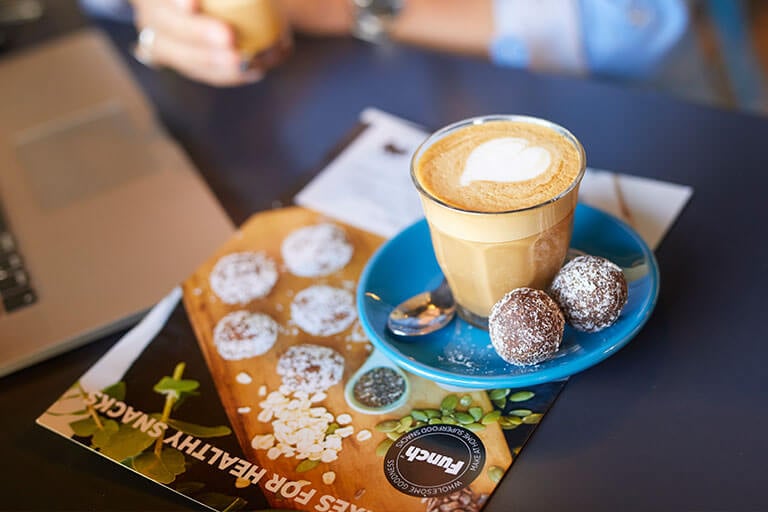
Flexibility + technology = productivity
When they founded Funch, flexibility was an imperative for the young mothers. As with other aspects of their business, they always look for ways to improve efficiencies, which can be easier said than done. Tanya says an open mind goes a long way and can ultimately help your bottom line.
“I guess we try to keep things fairly plain and flexible. We’re flexible in terms of vacation and working hours – we don’t go into the same office every day or anything like that. And we use technology to bridge those geographical gaps. Some mornings we’ll have meetings on Zoom, so I guess technology facilitates our flexibility.
We’re always improving efficiencies. That’s obviously really important to improving the health of our business and cash flow too. We always make time to reflect and think how we could have done something better. Similarly, if there’s something that’s not working very well, we’re very open to finding different solutions. Being nimble enables us to switch things around and try to make things better quickly.”
A new family member
Business owners understand the challenge of establishing work-life balance better than most. Going into running a business with that in mind helped Tanya and Lisa establish a balance easier than most. But it’s Tanya’s idea of incorporating the business into the family in an educational way that makes work feel less imposing and more enjoyable for her.
“Work-life balance is definitely a challenge. But your business also becomes part of the family too. Our families have pretty much grown up alongside the business, and they’ve all taste-tested a thousand different flavours. All our family and friends have been testers at some stage. And they can’t just eat something and go, “Mmm, yeah. That’s nice.” They have to articulate what they like about it, what flavours and textures they notice. What they don’t like about them. It’s a rigorous process, but they don’t complain.
I also like talking with the kids about the business, so they have much more of an understanding of what is actually going on. So rather than them thinking Mum’s just gone to work and not understanding anything past that, I educate them about the different aspects of running the business. I guess that’s one of the nice things about having a business that’s around your home – they have an awareness of the good as well as and the hard aspects of running a business.”
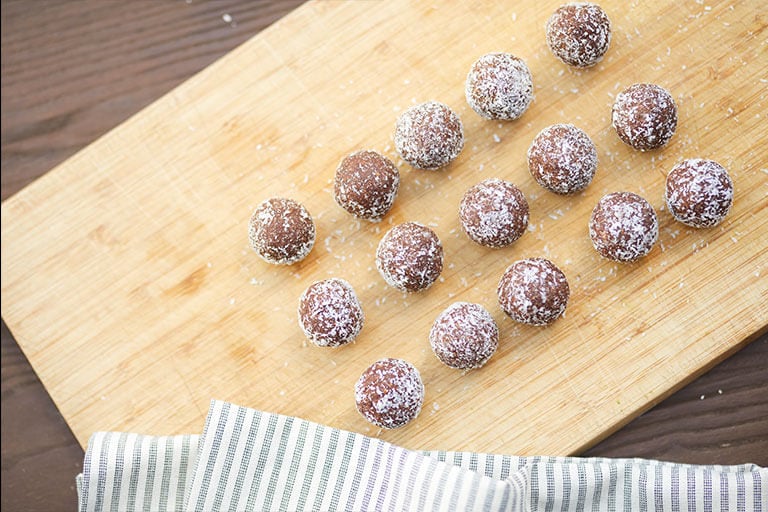
Rolling it forward
Funch set out to show kids and parents that healthy food can be delicious and even satisfy that familiar craving for something sweet. They wanted to show people that products full of refined sugar aren’t the only solution for a fast snack.
“I’m constantly surprised – a little disgruntled even – at the type of food kids are eating at school, especially what they’re offered at school canteens. If a kid has five dollars to spend, it’s a real challenge to find a filling, healthy snack. We’re trying to show kids that healthy food is actually delicious. Just because it’s healthy, or not chocolate, doesn’t mean it can’t still taste sweet and delicious. It’s really important that kids understand their health and the effect food has on them and, when they have free will to buy food, they actually have healthy options available.”
As Funch became more established, and their growth continued steadily upward, Tanya and Lisa dedicated more time to look into ways they could give back. They looked at ways they could minimise their environmental impact – by make their product zero waste – and help more kids access healthy food.
“It’s nice to think you can give back to people in tough situations. As most of the supermarkets are winding back plastic bags, we spend a lot of time with our family talking about how we can do things better. My kids are mad keen on nippers and surfing and that sort of stuff so they’re in the ocean all the time, so they’re very conscious of all the plastic in the ocean and how that’s affecting the world we live in.”
Healthy snacks, healthy schools.
Tanya and Lisa wanted to do more than just run a business, they wanted to give back and do more than just run a business for profit. They looked for ways to minimise Funch’s environmental impact, which led them to a zero-waste solution for the production of all their products, but they weren’t finished there. That’s when they found OzHarvest.
“We looked for a cause that we could help the most, and food waste is a huge issue in our society. But the way that we actually manufacture and produce Funch means that there isn’t any wastage in our production process. So we went back to the drawing board and that’s when we found OzHarvest. I was aware of some of the programs they run, including providing healthy lunches to kids who come to school hungry. I think every school kid should have the opportunity to eat healthy food, not just the ones who theoretically can afford it, so we donate Funch mixes so kids can eat healthily. People can also help kids in need by purchasing a bucket for a school canteen and we donate a packet. It’s our way of supporting kids who otherwise wouldn’t have the opportunity to be eating healthy snacks at school.”
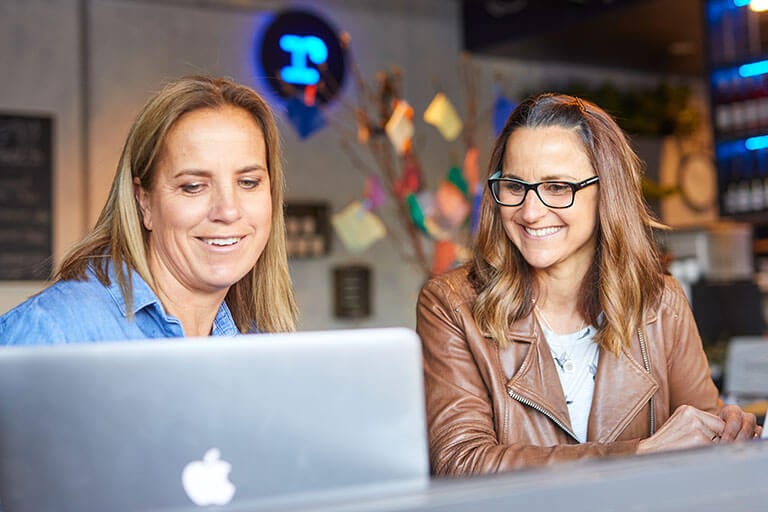
Strategic growth
Running a small business is a journey of ongoing learning that demands constant attention. Juggling the ordering, marketing, sales and planning for future growth while ensuring a positive cash flow can be overwhelming. Tanya and Lisa look at ways to grow strategically.
“Cash flow is always challenging. Trying to juggle the periods from when we make the products, sell the products, and then get paid, is difficult. Depending on who we’re dealing with there’s always that delay between production and payment. So that’s really tricky, and that is something we always have to keep an eye on, talk about, and manage as best we can. Because of that, and because we’re fully self-funded – we have no investors – our growth has to be strategic. We can’t do everything we want all at one time, so we prioritise. It means our growth is slower and more organic, but it forces us to be more creative and strategic.
An example of that is our online presence and growth. Rather than spending lots of money on our Google ad campaigns and things like that, we will look at collaborations with other companies to generate more exposure. We’ll do collaborations with other businesses, which might be a giveaway or an offer or something like that – it’s finding ways of working smarter that don’t come with the big cost. And in the retail space, it can be very effective for people to taste our products. Obviously, it’s quite expensive to have someone standing in a store and if the products have to go further afield the costs balloons. So we developed a portable tasting kit, that retailers can use to set up their own taste testing station in store – it’s been fantastic. So we can post those out to stores and they put those on their counter, and we achieve the same impact as an in-store tasting at a fraction of the cost.”
Open up to criticism and opportunity
Tanya believes humility and an openness to criticism are critical in discovering new opportunities for growth.
“Try to identify what isn’t working well, and be open to change what you’re doing so it might work better. You may be attached to something that isn’t working well. Being open-minded so that when something comes along you can take that opportunity or, better yet, go looking for those opportunities that lead to improvement and business growth. We started out with one store – we have a few hundred stores now – and now we also have multiple channels that we sell it through. So yeah, Funch has had a healthy growth trajectory throughout its life, which has been nice. And I guess that’s partly because we continue to explore – we bring out new products and continue searching for new markets as well.”
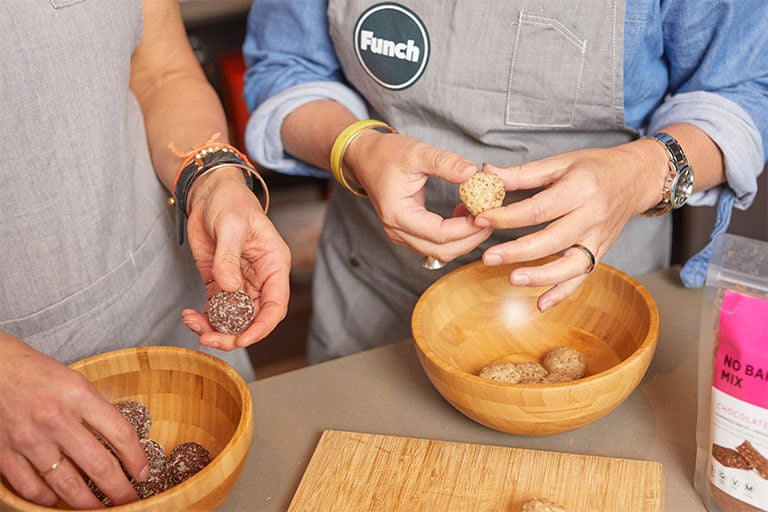
One thing I wish I knew
After years of learning, improving, setbacks, steps back and giant leaps forward, there is one thing Tanya wishes she knew when she and Lisa were starting out – understanding the margins and accounting side of the business.
“One bit of advice I wish I knew when we were starting out is to understand your margins. Also the importance of cash flow in keeping your business going. If you don’t understand your margins, they’re not big enough, you’re not selling your product for enough. You might also be selling a product for too much and you might be more successful with a leaner margin. So I guess it’s understanding your margins so you know what will work best. Managing your cash flow underpins the ongoing viability of your business.”
Tanya and Lisa are looking to grow their school canteen and food services markets. Beyond that, they will continue developing new products, new flavours and new ways to encourage healthy eating for growing kids and families.
Catastrophic muck-ups and how to avoid them
When a huge retailer says yes to stocking your product, you don’t think to challenge their payment terms. What if they say no? What if this lucrative order disappears? The alternative might just be that your revenue disappears. Read about the biggest catastrophic muck-up Tanya and Lisa experienced and the lesson they learnt.

